Reflective Journal: Applying Business Communication Skills Effectively
VerifiedAdded on 2023/04/21
|6
|1888
|55
Journal and Reflective Writing
AI Summary
This journal entry reflects on the application of business communication skills within a professional setting, emphasizing the critical role of effective communication in management and organizational success. It delves into the impact of various communication methods, the importance of reflective practices for improving communication strategies, and the influence of individual learning styles on communication effectiveness. The journal also highlights relevant communication skills such as active listening, writing proficiency, and interpersonal abilities, relating them to personal experiences and challenges encountered in team settings. The reflection culminates in an analysis of a successful communication initiative and a challenging scenario, underscoring the need for continuous improvement and adaptation in communication approaches to foster better collaboration and productivity. Desklib offers a variety of resources, including past papers and solved assignments, to support students in mastering these essential communication skills.
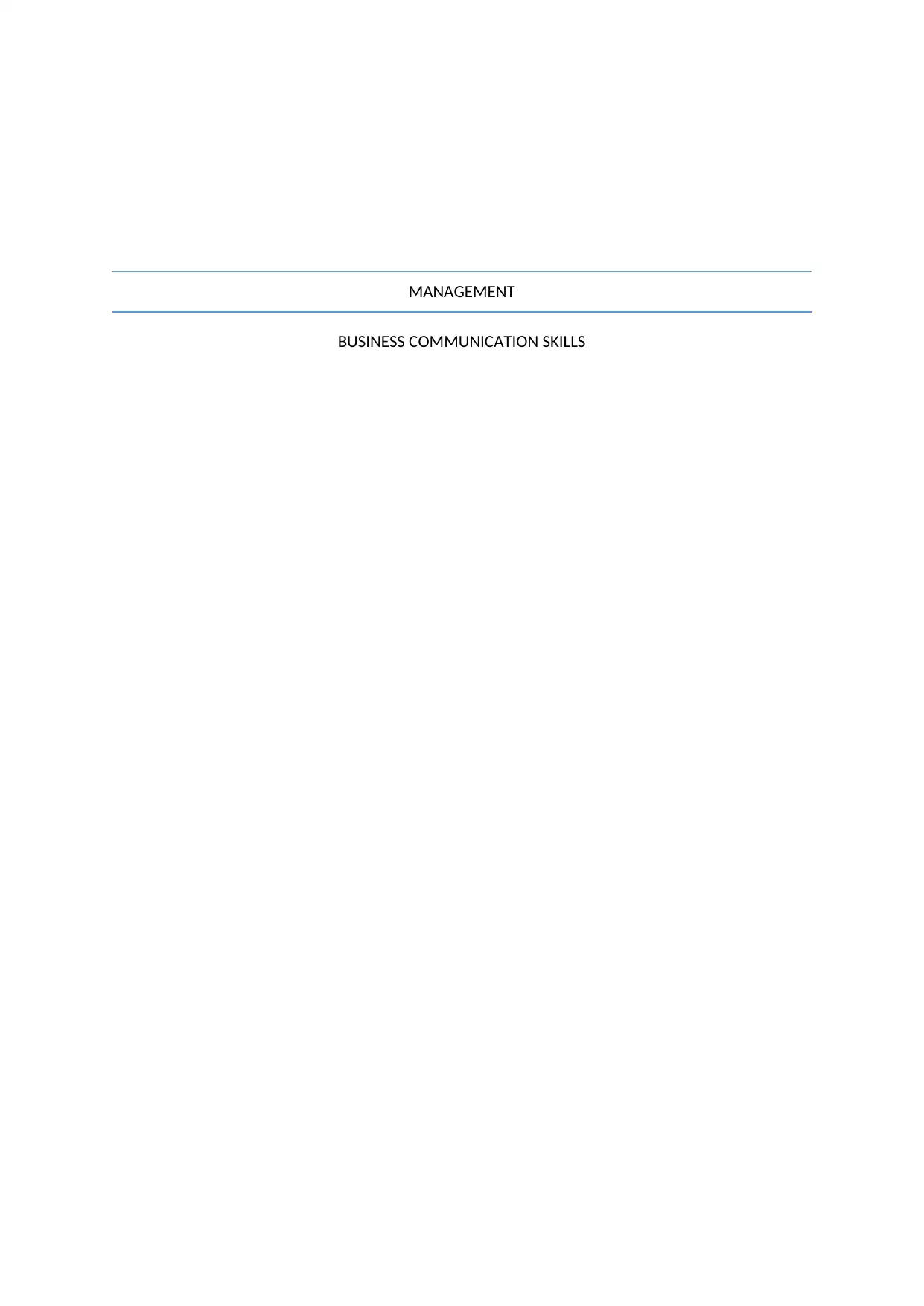
MANAGEMENT
BUSINESS COMMUNICATION SKILLS
BUSINESS COMMUNICATION SKILLS
Paraphrase This Document
Need a fresh take? Get an instant paraphrase of this document with our AI Paraphraser
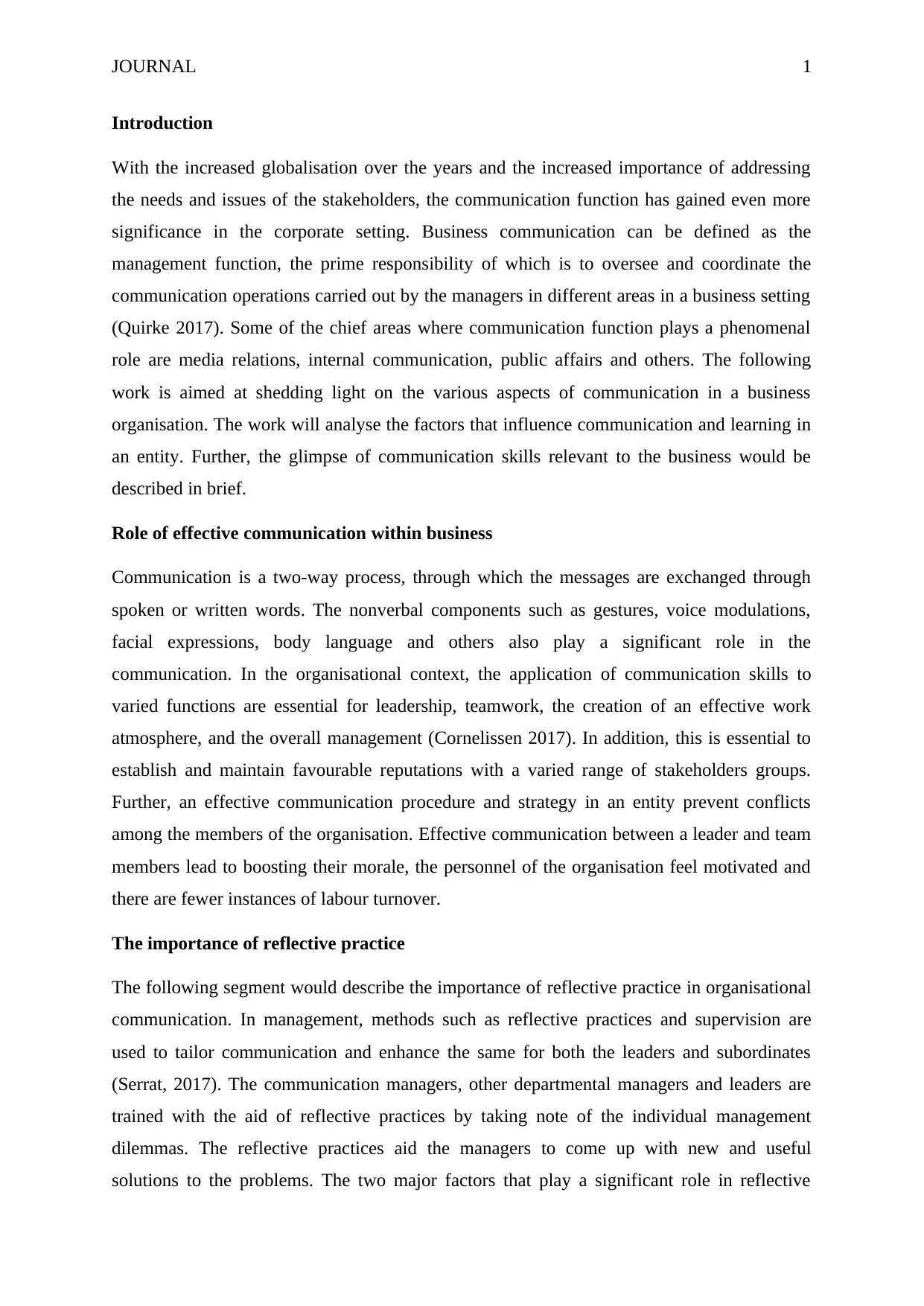
JOURNAL 1
Introduction
With the increased globalisation over the years and the increased importance of addressing
the needs and issues of the stakeholders, the communication function has gained even more
significance in the corporate setting. Business communication can be defined as the
management function, the prime responsibility of which is to oversee and coordinate the
communication operations carried out by the managers in different areas in a business setting
(Quirke 2017). Some of the chief areas where communication function plays a phenomenal
role are media relations, internal communication, public affairs and others. The following
work is aimed at shedding light on the various aspects of communication in a business
organisation. The work will analyse the factors that influence communication and learning in
an entity. Further, the glimpse of communication skills relevant to the business would be
described in brief.
Role of effective communication within business
Communication is a two-way process, through which the messages are exchanged through
spoken or written words. The nonverbal components such as gestures, voice modulations,
facial expressions, body language and others also play a significant role in the
communication. In the organisational context, the application of communication skills to
varied functions are essential for leadership, teamwork, the creation of an effective work
atmosphere, and the overall management (Cornelissen 2017). In addition, this is essential to
establish and maintain favourable reputations with a varied range of stakeholders groups.
Further, an effective communication procedure and strategy in an entity prevent conflicts
among the members of the organisation. Effective communication between a leader and team
members lead to boosting their morale, the personnel of the organisation feel motivated and
there are fewer instances of labour turnover.
The importance of reflective practice
The following segment would describe the importance of reflective practice in organisational
communication. In management, methods such as reflective practices and supervision are
used to tailor communication and enhance the same for both the leaders and subordinates
(Serrat, 2017). The communication managers, other departmental managers and leaders are
trained with the aid of reflective practices by taking note of the individual management
dilemmas. The reflective practices aid the managers to come up with new and useful
solutions to the problems. The two major factors that play a significant role in reflective
Introduction
With the increased globalisation over the years and the increased importance of addressing
the needs and issues of the stakeholders, the communication function has gained even more
significance in the corporate setting. Business communication can be defined as the
management function, the prime responsibility of which is to oversee and coordinate the
communication operations carried out by the managers in different areas in a business setting
(Quirke 2017). Some of the chief areas where communication function plays a phenomenal
role are media relations, internal communication, public affairs and others. The following
work is aimed at shedding light on the various aspects of communication in a business
organisation. The work will analyse the factors that influence communication and learning in
an entity. Further, the glimpse of communication skills relevant to the business would be
described in brief.
Role of effective communication within business
Communication is a two-way process, through which the messages are exchanged through
spoken or written words. The nonverbal components such as gestures, voice modulations,
facial expressions, body language and others also play a significant role in the
communication. In the organisational context, the application of communication skills to
varied functions are essential for leadership, teamwork, the creation of an effective work
atmosphere, and the overall management (Cornelissen 2017). In addition, this is essential to
establish and maintain favourable reputations with a varied range of stakeholders groups.
Further, an effective communication procedure and strategy in an entity prevent conflicts
among the members of the organisation. Effective communication between a leader and team
members lead to boosting their morale, the personnel of the organisation feel motivated and
there are fewer instances of labour turnover.
The importance of reflective practice
The following segment would describe the importance of reflective practice in organisational
communication. In management, methods such as reflective practices and supervision are
used to tailor communication and enhance the same for both the leaders and subordinates
(Serrat, 2017). The communication managers, other departmental managers and leaders are
trained with the aid of reflective practices by taking note of the individual management
dilemmas. The reflective practices aid the managers to come up with new and useful
solutions to the problems. The two major factors that play a significant role in reflective
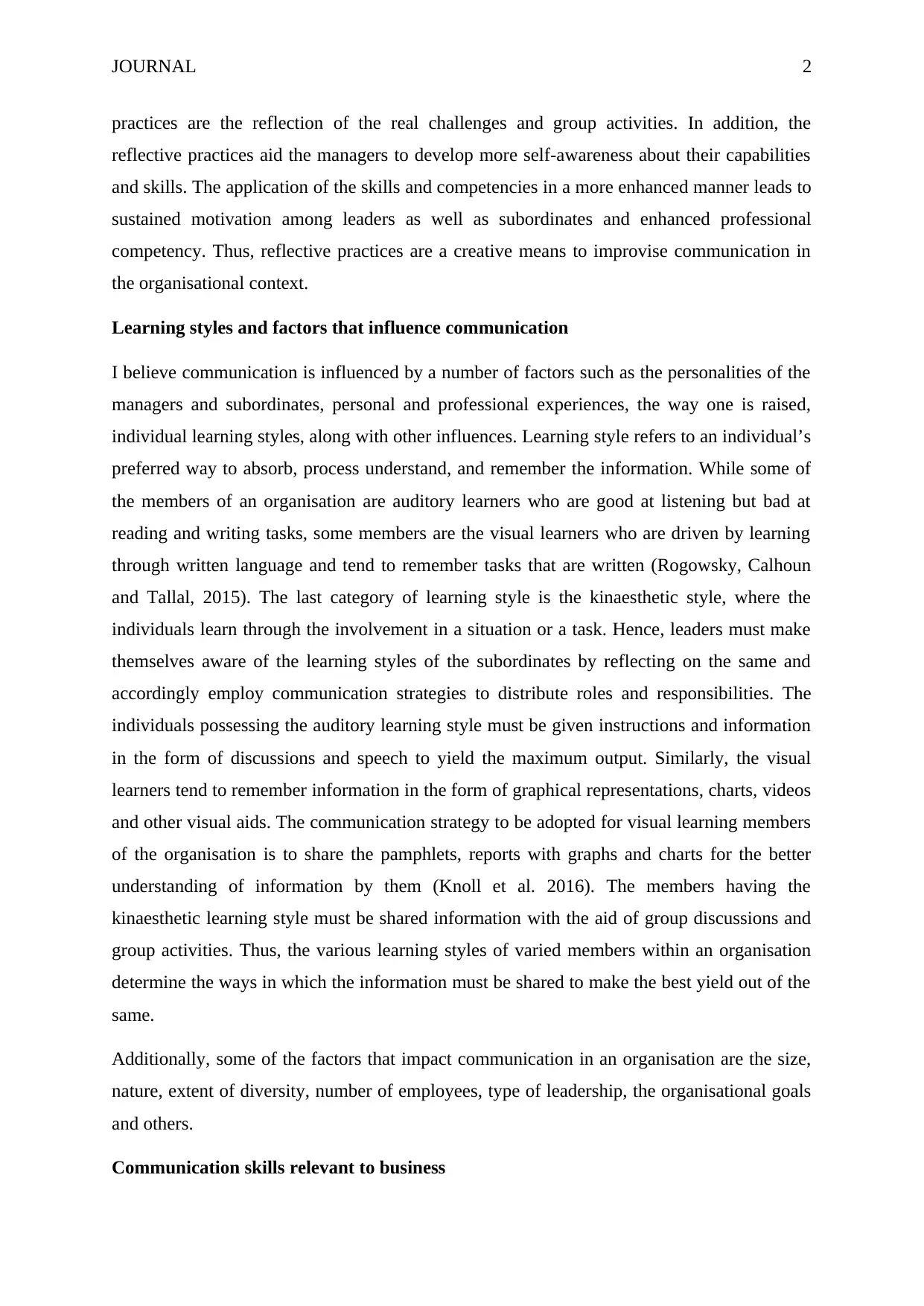
JOURNAL 2
practices are the reflection of the real challenges and group activities. In addition, the
reflective practices aid the managers to develop more self-awareness about their capabilities
and skills. The application of the skills and competencies in a more enhanced manner leads to
sustained motivation among leaders as well as subordinates and enhanced professional
competency. Thus, reflective practices are a creative means to improvise communication in
the organisational context.
Learning styles and factors that influence communication
I believe communication is influenced by a number of factors such as the personalities of the
managers and subordinates, personal and professional experiences, the way one is raised,
individual learning styles, along with other influences. Learning style refers to an individual’s
preferred way to absorb, process understand, and remember the information. While some of
the members of an organisation are auditory learners who are good at listening but bad at
reading and writing tasks, some members are the visual learners who are driven by learning
through written language and tend to remember tasks that are written (Rogowsky, Calhoun
and Tallal, 2015). The last category of learning style is the kinaesthetic style, where the
individuals learn through the involvement in a situation or a task. Hence, leaders must make
themselves aware of the learning styles of the subordinates by reflecting on the same and
accordingly employ communication strategies to distribute roles and responsibilities. The
individuals possessing the auditory learning style must be given instructions and information
in the form of discussions and speech to yield the maximum output. Similarly, the visual
learners tend to remember information in the form of graphical representations, charts, videos
and other visual aids. The communication strategy to be adopted for visual learning members
of the organisation is to share the pamphlets, reports with graphs and charts for the better
understanding of information by them (Knoll et al. 2016). The members having the
kinaesthetic learning style must be shared information with the aid of group discussions and
group activities. Thus, the various learning styles of varied members within an organisation
determine the ways in which the information must be shared to make the best yield out of the
same.
Additionally, some of the factors that impact communication in an organisation are the size,
nature, extent of diversity, number of employees, type of leadership, the organisational goals
and others.
Communication skills relevant to business
practices are the reflection of the real challenges and group activities. In addition, the
reflective practices aid the managers to develop more self-awareness about their capabilities
and skills. The application of the skills and competencies in a more enhanced manner leads to
sustained motivation among leaders as well as subordinates and enhanced professional
competency. Thus, reflective practices are a creative means to improvise communication in
the organisational context.
Learning styles and factors that influence communication
I believe communication is influenced by a number of factors such as the personalities of the
managers and subordinates, personal and professional experiences, the way one is raised,
individual learning styles, along with other influences. Learning style refers to an individual’s
preferred way to absorb, process understand, and remember the information. While some of
the members of an organisation are auditory learners who are good at listening but bad at
reading and writing tasks, some members are the visual learners who are driven by learning
through written language and tend to remember tasks that are written (Rogowsky, Calhoun
and Tallal, 2015). The last category of learning style is the kinaesthetic style, where the
individuals learn through the involvement in a situation or a task. Hence, leaders must make
themselves aware of the learning styles of the subordinates by reflecting on the same and
accordingly employ communication strategies to distribute roles and responsibilities. The
individuals possessing the auditory learning style must be given instructions and information
in the form of discussions and speech to yield the maximum output. Similarly, the visual
learners tend to remember information in the form of graphical representations, charts, videos
and other visual aids. The communication strategy to be adopted for visual learning members
of the organisation is to share the pamphlets, reports with graphs and charts for the better
understanding of information by them (Knoll et al. 2016). The members having the
kinaesthetic learning style must be shared information with the aid of group discussions and
group activities. Thus, the various learning styles of varied members within an organisation
determine the ways in which the information must be shared to make the best yield out of the
same.
Additionally, some of the factors that impact communication in an organisation are the size,
nature, extent of diversity, number of employees, type of leadership, the organisational goals
and others.
Communication skills relevant to business
⊘ This is a preview!⊘
Do you want full access?
Subscribe today to unlock all pages.

Trusted by 1+ million students worldwide
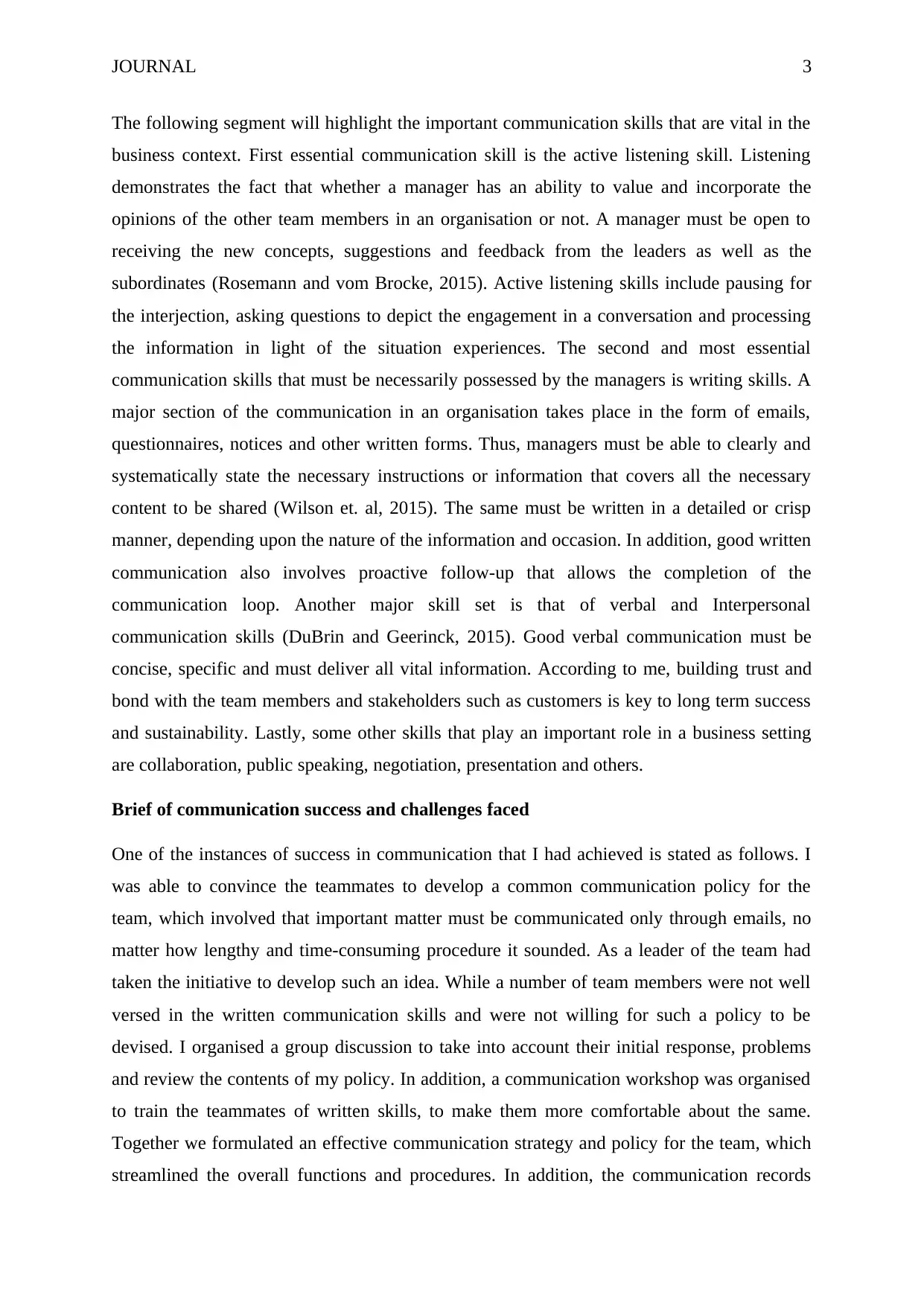
JOURNAL 3
The following segment will highlight the important communication skills that are vital in the
business context. First essential communication skill is the active listening skill. Listening
demonstrates the fact that whether a manager has an ability to value and incorporate the
opinions of the other team members in an organisation or not. A manager must be open to
receiving the new concepts, suggestions and feedback from the leaders as well as the
subordinates (Rosemann and vom Brocke, 2015). Active listening skills include pausing for
the interjection, asking questions to depict the engagement in a conversation and processing
the information in light of the situation experiences. The second and most essential
communication skills that must be necessarily possessed by the managers is writing skills. A
major section of the communication in an organisation takes place in the form of emails,
questionnaires, notices and other written forms. Thus, managers must be able to clearly and
systematically state the necessary instructions or information that covers all the necessary
content to be shared (Wilson et. al, 2015). The same must be written in a detailed or crisp
manner, depending upon the nature of the information and occasion. In addition, good written
communication also involves proactive follow-up that allows the completion of the
communication loop. Another major skill set is that of verbal and Interpersonal
communication skills (DuBrin and Geerinck, 2015). Good verbal communication must be
concise, specific and must deliver all vital information. According to me, building trust and
bond with the team members and stakeholders such as customers is key to long term success
and sustainability. Lastly, some other skills that play an important role in a business setting
are collaboration, public speaking, negotiation, presentation and others.
Brief of communication success and challenges faced
One of the instances of success in communication that I had achieved is stated as follows. I
was able to convince the teammates to develop a common communication policy for the
team, which involved that important matter must be communicated only through emails, no
matter how lengthy and time-consuming procedure it sounded. As a leader of the team had
taken the initiative to develop such an idea. While a number of team members were not well
versed in the written communication skills and were not willing for such a policy to be
devised. I organised a group discussion to take into account their initial response, problems
and review the contents of my policy. In addition, a communication workshop was organised
to train the teammates of written skills, to make them more comfortable about the same.
Together we formulated an effective communication strategy and policy for the team, which
streamlined the overall functions and procedures. In addition, the communication records
The following segment will highlight the important communication skills that are vital in the
business context. First essential communication skill is the active listening skill. Listening
demonstrates the fact that whether a manager has an ability to value and incorporate the
opinions of the other team members in an organisation or not. A manager must be open to
receiving the new concepts, suggestions and feedback from the leaders as well as the
subordinates (Rosemann and vom Brocke, 2015). Active listening skills include pausing for
the interjection, asking questions to depict the engagement in a conversation and processing
the information in light of the situation experiences. The second and most essential
communication skills that must be necessarily possessed by the managers is writing skills. A
major section of the communication in an organisation takes place in the form of emails,
questionnaires, notices and other written forms. Thus, managers must be able to clearly and
systematically state the necessary instructions or information that covers all the necessary
content to be shared (Wilson et. al, 2015). The same must be written in a detailed or crisp
manner, depending upon the nature of the information and occasion. In addition, good written
communication also involves proactive follow-up that allows the completion of the
communication loop. Another major skill set is that of verbal and Interpersonal
communication skills (DuBrin and Geerinck, 2015). Good verbal communication must be
concise, specific and must deliver all vital information. According to me, building trust and
bond with the team members and stakeholders such as customers is key to long term success
and sustainability. Lastly, some other skills that play an important role in a business setting
are collaboration, public speaking, negotiation, presentation and others.
Brief of communication success and challenges faced
One of the instances of success in communication that I had achieved is stated as follows. I
was able to convince the teammates to develop a common communication policy for the
team, which involved that important matter must be communicated only through emails, no
matter how lengthy and time-consuming procedure it sounded. As a leader of the team had
taken the initiative to develop such an idea. While a number of team members were not well
versed in the written communication skills and were not willing for such a policy to be
devised. I organised a group discussion to take into account their initial response, problems
and review the contents of my policy. In addition, a communication workshop was organised
to train the teammates of written skills, to make them more comfortable about the same.
Together we formulated an effective communication strategy and policy for the team, which
streamlined the overall functions and procedures. In addition, the communication records
Paraphrase This Document
Need a fresh take? Get an instant paraphrase of this document with our AI Paraphraser
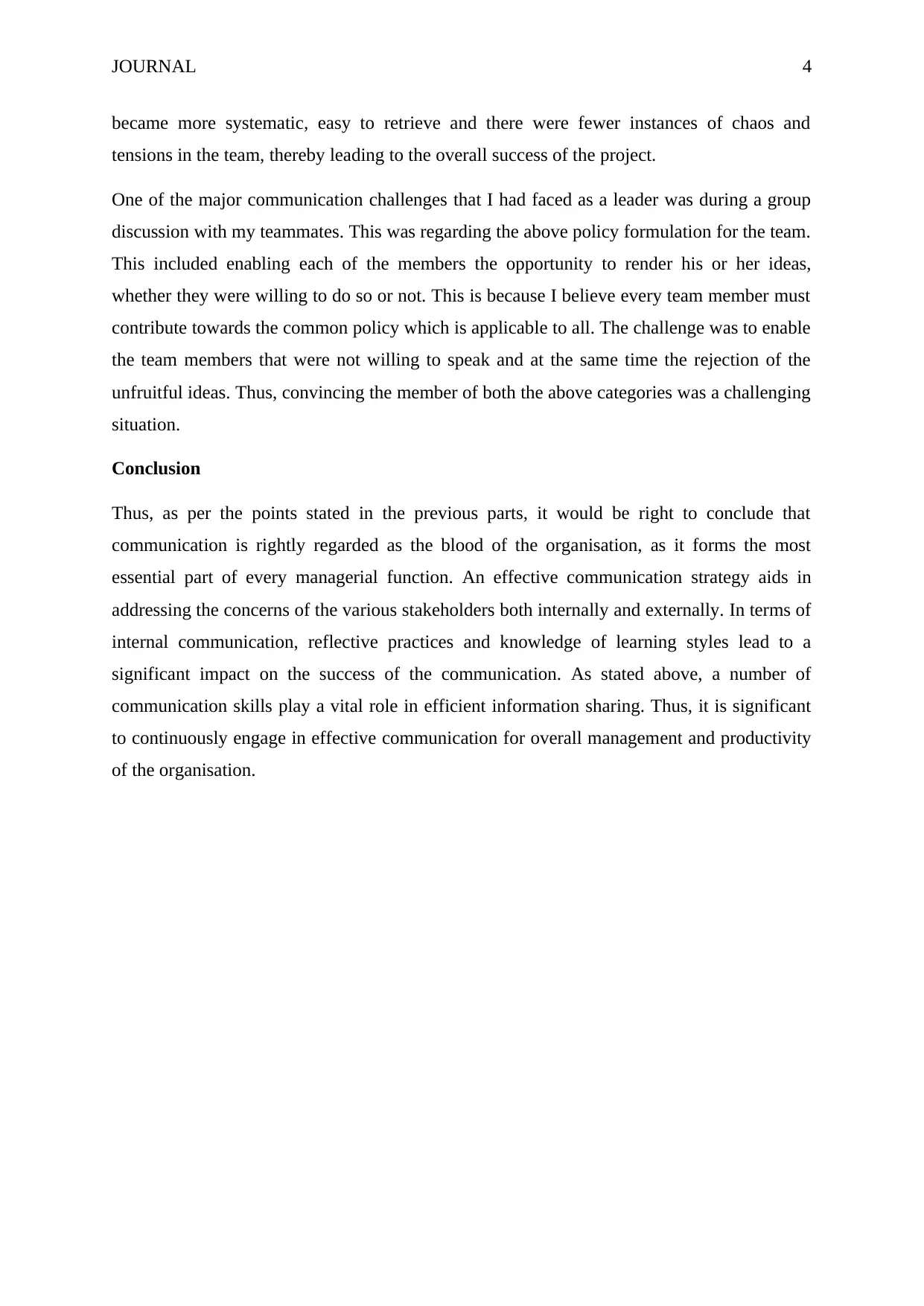
JOURNAL 4
became more systematic, easy to retrieve and there were fewer instances of chaos and
tensions in the team, thereby leading to the overall success of the project.
One of the major communication challenges that I had faced as a leader was during a group
discussion with my teammates. This was regarding the above policy formulation for the team.
This included enabling each of the members the opportunity to render his or her ideas,
whether they were willing to do so or not. This is because I believe every team member must
contribute towards the common policy which is applicable to all. The challenge was to enable
the team members that were not willing to speak and at the same time the rejection of the
unfruitful ideas. Thus, convincing the member of both the above categories was a challenging
situation.
Conclusion
Thus, as per the points stated in the previous parts, it would be right to conclude that
communication is rightly regarded as the blood of the organisation, as it forms the most
essential part of every managerial function. An effective communication strategy aids in
addressing the concerns of the various stakeholders both internally and externally. In terms of
internal communication, reflective practices and knowledge of learning styles lead to a
significant impact on the success of the communication. As stated above, a number of
communication skills play a vital role in efficient information sharing. Thus, it is significant
to continuously engage in effective communication for overall management and productivity
of the organisation.
became more systematic, easy to retrieve and there were fewer instances of chaos and
tensions in the team, thereby leading to the overall success of the project.
One of the major communication challenges that I had faced as a leader was during a group
discussion with my teammates. This was regarding the above policy formulation for the team.
This included enabling each of the members the opportunity to render his or her ideas,
whether they were willing to do so or not. This is because I believe every team member must
contribute towards the common policy which is applicable to all. The challenge was to enable
the team members that were not willing to speak and at the same time the rejection of the
unfruitful ideas. Thus, convincing the member of both the above categories was a challenging
situation.
Conclusion
Thus, as per the points stated in the previous parts, it would be right to conclude that
communication is rightly regarded as the blood of the organisation, as it forms the most
essential part of every managerial function. An effective communication strategy aids in
addressing the concerns of the various stakeholders both internally and externally. In terms of
internal communication, reflective practices and knowledge of learning styles lead to a
significant impact on the success of the communication. As stated above, a number of
communication skills play a vital role in efficient information sharing. Thus, it is significant
to continuously engage in effective communication for overall management and productivity
of the organisation.
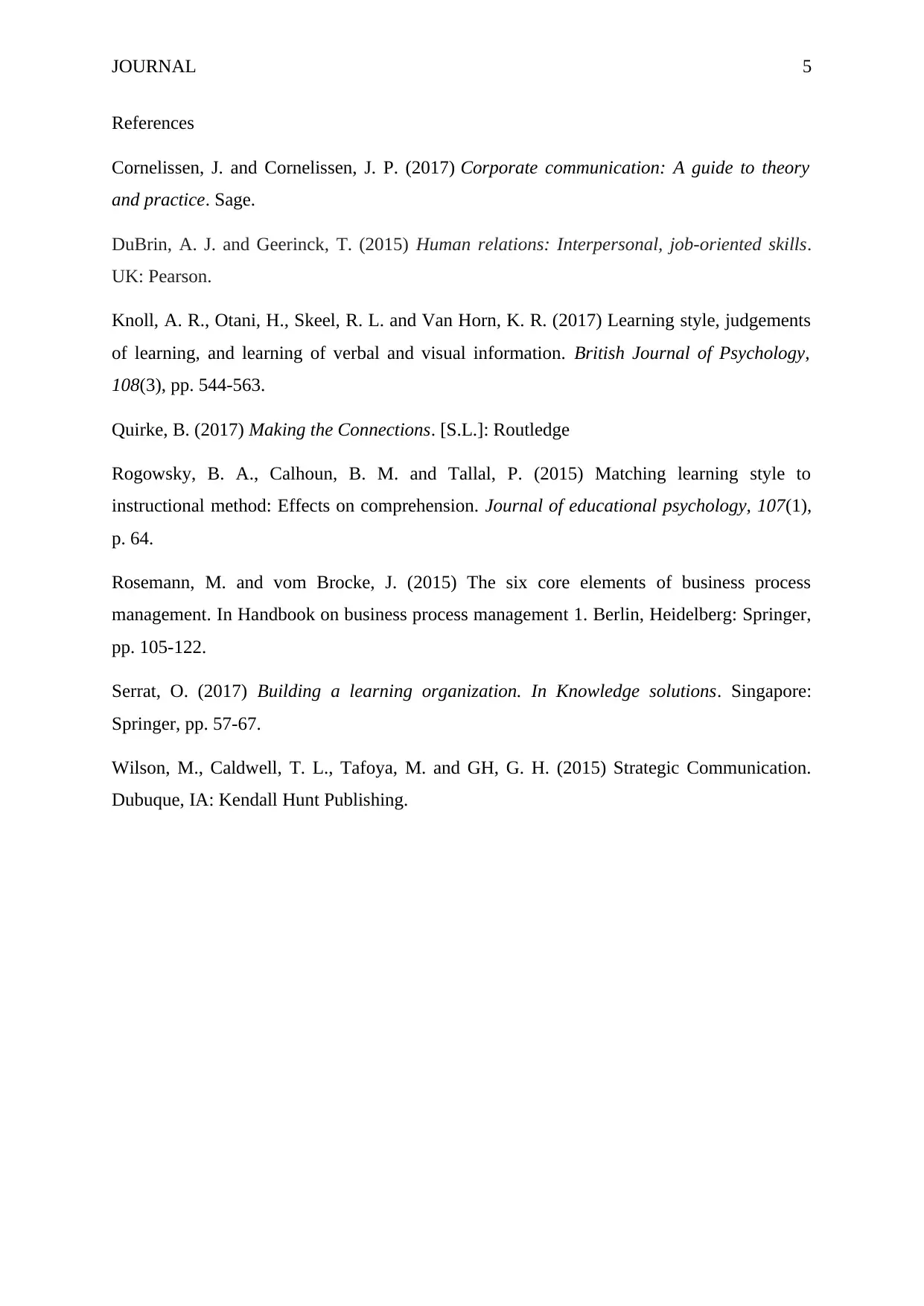
JOURNAL 5
References
Cornelissen, J. and Cornelissen, J. P. (2017) Corporate communication: A guide to theory
and practice. Sage.
DuBrin, A. J. and Geerinck, T. (2015) Human relations: Interpersonal, job-oriented skills.
UK: Pearson.
Knoll, A. R., Otani, H., Skeel, R. L. and Van Horn, K. R. (2017) Learning style, judgements
of learning, and learning of verbal and visual information. British Journal of Psychology,
108(3), pp. 544-563.
Quirke, B. (2017) Making the Connections. [S.L.]: Routledge
Rogowsky, B. A., Calhoun, B. M. and Tallal, P. (2015) Matching learning style to
instructional method: Effects on comprehension. Journal of educational psychology, 107(1),
p. 64.
Rosemann, M. and vom Brocke, J. (2015) The six core elements of business process
management. In Handbook on business process management 1. Berlin, Heidelberg: Springer,
pp. 105-122.
Serrat, O. (2017) Building a learning organization. In Knowledge solutions. Singapore:
Springer, pp. 57-67.
Wilson, M., Caldwell, T. L., Tafoya, M. and GH, G. H. (2015) Strategic Communication.
Dubuque, IA: Kendall Hunt Publishing.
References
Cornelissen, J. and Cornelissen, J. P. (2017) Corporate communication: A guide to theory
and practice. Sage.
DuBrin, A. J. and Geerinck, T. (2015) Human relations: Interpersonal, job-oriented skills.
UK: Pearson.
Knoll, A. R., Otani, H., Skeel, R. L. and Van Horn, K. R. (2017) Learning style, judgements
of learning, and learning of verbal and visual information. British Journal of Psychology,
108(3), pp. 544-563.
Quirke, B. (2017) Making the Connections. [S.L.]: Routledge
Rogowsky, B. A., Calhoun, B. M. and Tallal, P. (2015) Matching learning style to
instructional method: Effects on comprehension. Journal of educational psychology, 107(1),
p. 64.
Rosemann, M. and vom Brocke, J. (2015) The six core elements of business process
management. In Handbook on business process management 1. Berlin, Heidelberg: Springer,
pp. 105-122.
Serrat, O. (2017) Building a learning organization. In Knowledge solutions. Singapore:
Springer, pp. 57-67.
Wilson, M., Caldwell, T. L., Tafoya, M. and GH, G. H. (2015) Strategic Communication.
Dubuque, IA: Kendall Hunt Publishing.
⊘ This is a preview!⊘
Do you want full access?
Subscribe today to unlock all pages.

Trusted by 1+ million students worldwide
1 out of 6
Related Documents
Your All-in-One AI-Powered Toolkit for Academic Success.
+13062052269
info@desklib.com
Available 24*7 on WhatsApp / Email
![[object Object]](/_next/static/media/star-bottom.7253800d.svg)
Unlock your academic potential
Copyright © 2020–2026 A2Z Services. All Rights Reserved. Developed and managed by ZUCOL.





